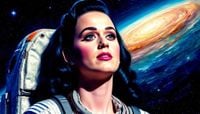On April 14, 2025, a team of six women made headlines by embarking on an 11-minute journey to the edge of space aboard a rocket capsule developed by Jeff Bezos's space company, Blue Origin. This mission, which included notable figures such as singer Katy Perry, journalist Gayle King, and Bezos's fiancée Lauren Sánchez, was intended to symbolize empowerment and inspire future generations. However, it quickly became a focal point for criticism and debate about the value of such space tourism endeavors.
Katy Perry, who has long dreamed of flying into space, stated that her motivation for participating was to demonstrate to her four-year-old daughter, Daisy, that there are no obstacles on the path to pursuing one's dreams. "I want to show my daughter that anything is possible," Perry said, reflecting her aspirations and the personal significance of the flight.
Despite the intended message of empowerment, the flight faced a backlash from various quarters. Actress Olivia Munn criticized the mission for lacking scientific merit, while model and actress Emily Ratajkowski expressed concerns about its environmental impact, labeling it a "disgusting trick". Ratajkowski emphasized that while the wealthy engage in space tourism, millions struggle for survival on Earth.
Blue Origin responded to the criticism by asserting that the launch had minimal environmental impact, claiming that the carbon dioxide emissions were even less than those produced by a typical car. However, this assurance did little to quell the rising tide of skepticism. Critics noted that the flight seemed more like a public relations stunt than a genuine scientific endeavor.
After just two days of training, the participants were granted astronaut status, which some observers found ironic. The flight's critics took to social media, with one commentator remarking, "It's like an expensive photo session against the backdrop of space." This sentiment was echoed by actress Olivia Wilde, who quipped on Instagram, "For a billion dollars, one could finance climate research, not post selfies on social networks." Such comments underscored a growing frustration with the perceived frivolity of billionaire-funded space tourism.
Despite the criticism, the participants maintained that their mission was about breaking barriers and inspiring young women. Lauren Sánchez stated, "We are opening up space for future generations of women," while Gayle King expressed pride in receiving letters from girls who aspire to follow in their footsteps. "Every letter from girls who wrote 'I want that too' is our common victory," King remarked, emphasizing the positive impact they hoped to achieve.
However, the public reaction remained mixed. Many questioned the ethical implications of spending vast sums on space tourism when pressing issues on Earth, such as climate change and social inequality, demand attention and resources. Teacher Nina Turner harshly compared Bezos's spending on the flight to the cost of a year of treatment for millions of Americans, highlighting the disparity between the wealthy elite and the average citizen.
This flight raises significant questions about the role of the super-rich in social development and the appropriateness of investing in such luxury projects. Analysts pointed out that suborbital trips remain a luxury accessible to less than 1% of the global population, and their contributions to scientific knowledge are minimal at best. Space expert Michael Lopez-Alegria likened the current state of space tourism to the early days of automobiles: "It's expensive and useless, but over time, technologies become accessible to everyone."
As the debate continues, it is clear that the intersection of wealth, space exploration, and social responsibility is a contentious issue. While the mission aimed to inspire and empower, it also highlighted the stark realities of inequality and the ethical considerations surrounding such extravagant expenditures. The juxtaposition of glamorous space tourism against the backdrop of pressing earthly issues raises profound questions about priorities and values in our society.
In the end, the Blue Origin flight serves as a reminder that while the allure of space travel captivates many, the implications of such endeavors extend far beyond the thrill of the experience. As more billionaires turn their eyes to the stars, the challenge remains to ensure that their pursuits do not overshadow the urgent needs of our planet and its inhabitants.







